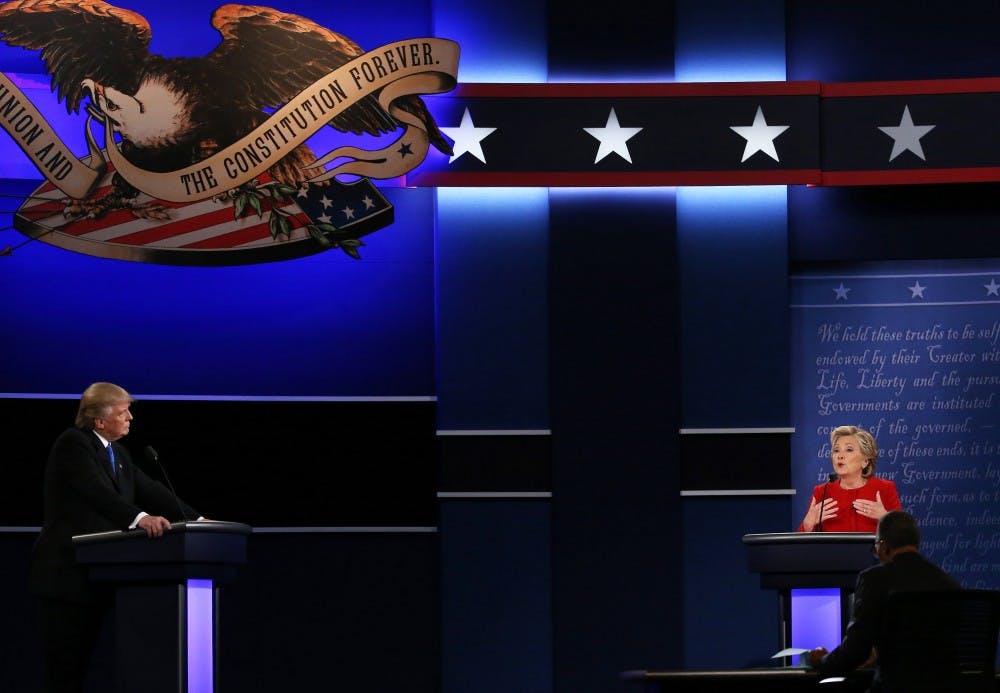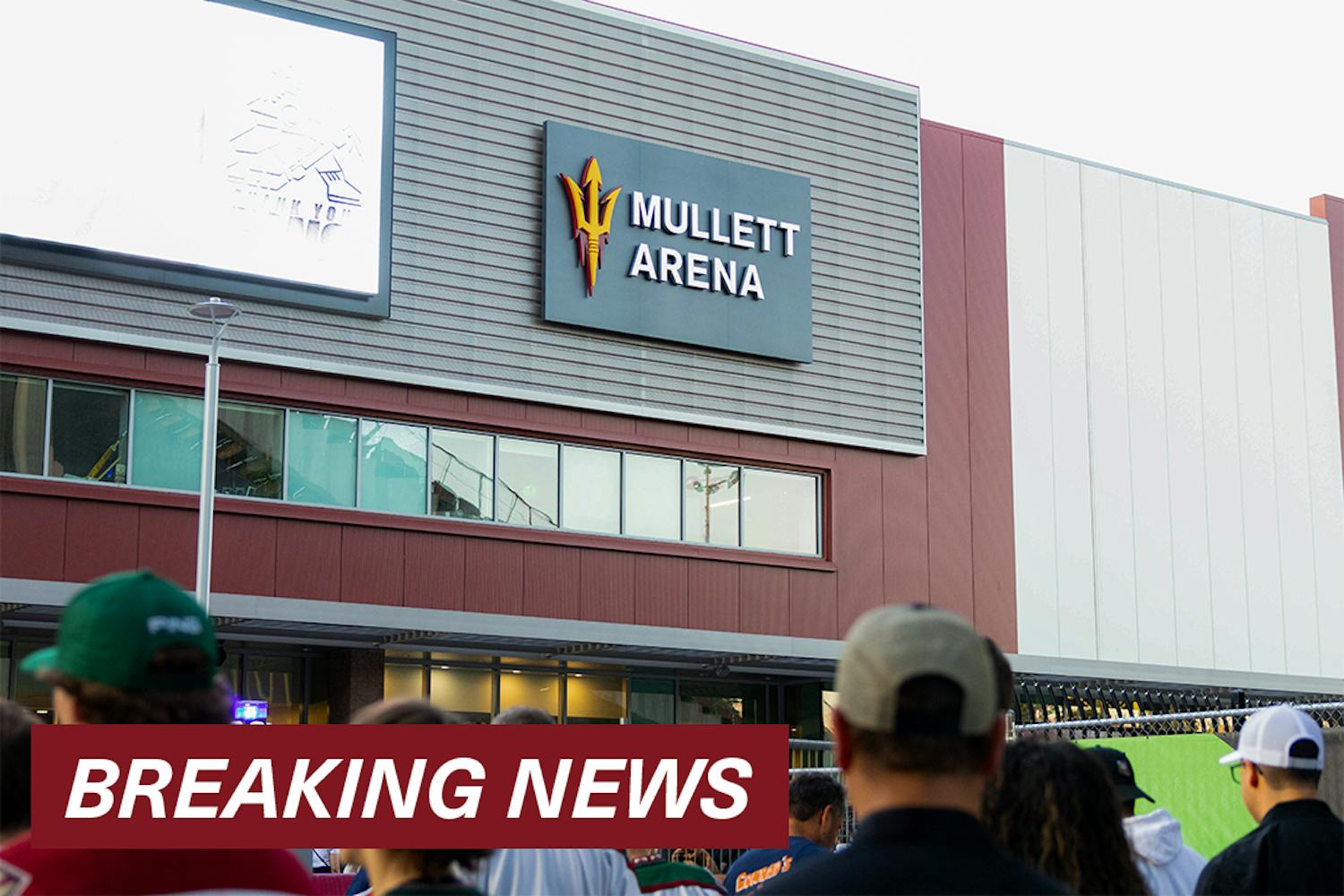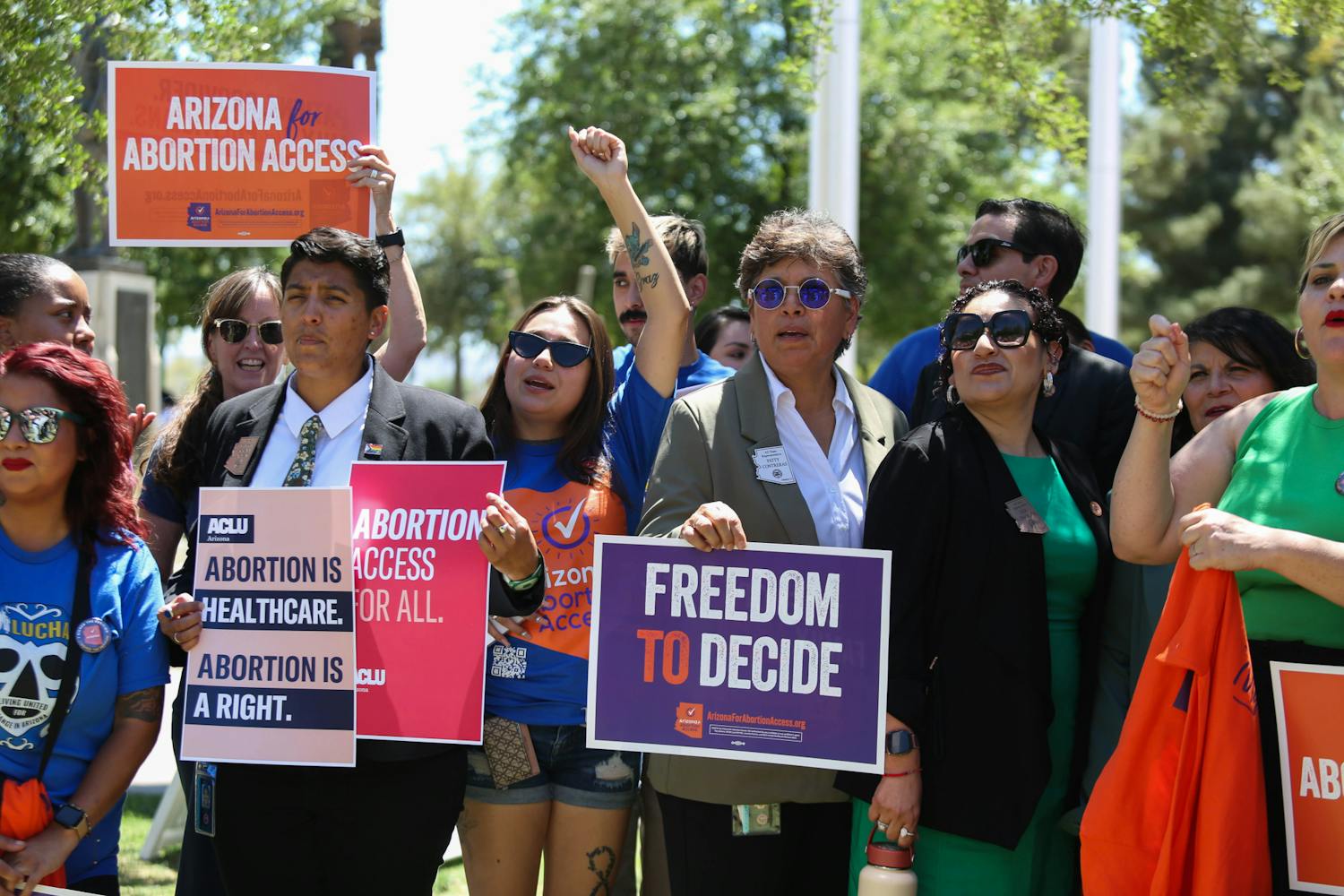Presidential nominees Donald Trump and Hillary Clinton joined NBC Nightly News Anchor and debate moderator Lester Holt at Hofstra University on Monday to discuss economic conflicts, nuclear weapons concerns, rising race issues and national safety in the first presidential debate.
Although the debate was not without its potshots, policy discussion found its way into the political free-for-all.
Education and the economy
Clinton focused on family economics and argued for equal pay for women — a staple of her campaign platform.
“I want us to invest in you — I want us to invest in your future," Clinton said from the podium. “We also have to make the economy fairer. That starts with raising the national minimum wage and also guarantee, finally, equal pay for woman's work."
Clinton emphasized her dedication to making college more accessible and appealing to budget-conscious students.
"I think building the middle class, investing in the middle class, making college debt-free so more young people can get their education, helping people refinance their debt from college at a lower rate — those are the kinds of things that will really boost the economy," she said.
While Clinton focused on the economy at home, Trump set his scope overseas.
Trump reiterated one of his popular talking points about creating incentives to keep manufacturers in America to prevent outsourcing.
"Our jobs are fleeing the country," Trump said. "We’re losing so many jobs. We have to stop our companies from leaving the United States ... We need to renegotiate our trade deals."
Trump was quick to criticize Clinton about the lack of policy she has created throughout her time in Congress regarding the job market.
"You’ve been doing this for 30 years," he said. "Why are you just thinking about solutions right now?"
Clinton responded by saying it was something she had "thought about quite a bit." Trump quipped a quick response, "Yeah, for 30 years."
Although Clinton spoke more to higher education than Trump did, college-aged voters make up a sizable voting block. According to the Pew Research Center, the number of voting-aged Millennials is now equal to that of Baby Boomers.
Kevin Dale, executive editor for Cronkite News and post-debate panelist at ASU's downtown Phoenix campus, said he would suggest any voter, student or not, should look for things that are important to them when evaluating a potential candidate.
"Dive into those topics, find out which candidates are speaking to your issues, and when you hear those, then maybe that person resonates with you," Dale said at the panel discussion. "Whatever is important to you, find out what each candidate thinks about that, and then that’s how you make your decisions.”
Environment
Clinton also suggested more investment in energy, particularly in clean, solar energy.
“We can deploy half a billion more solar panels," she said. "We can have enough clean energy to power every home can build a new modern electric grid. Th
Trump was quick to refuse her panel proposal after noting the failure of solar energy after America's investment.
"We invested in a solar company our country — that was a disaster," he said. "They lost plenty of money on that one. I’m a great believer in all forms of energy but we’re putting a lot of people out of work. Our energy policies are a disaster."
Susannah Sandrin, a clinical associate professor of environmental science and science education at ASU, said she was disappointed in the small amount of time the candidates spent on the topic.
"Students in my classes seem very aware that there is not a 'quick fix' and that it will take
Sandrin said she believes students want to hear practical, educated ideas from their elected officials about energy policies and climate change.
"Students are thinking about the future of their cities, their country and the world around them," Sandrin said. "They care deeply about others and want to leave the world a better place."
Race relations and firearm legislation
Holt challenged the candidates to address rising racial concerns in America, a hot topic due to the multiple police-involved shooting deaths receiving national attention within the past week.
Clinton argued that the criminal justice system needs reformation over any other type of action.
"We have to restore trust between communities and the police," she said. "We have to work to make sure that our police are using the best training, the best techniques, that they’re well prepared to use force only when necessary."
Clinton challenged Americans to recognize the police officers who effect change within their own departments, as well.
"We have to bring communities together in order to begin working on that as a mutual goal," she said. "And we've got to get guns out of the hands of people who shouldn't have them."
Trump noted Chicago's issue with gun violence as a prime example of why America needs to restore the balance between law and order.
"We have a situation where we have our inner cities, African-American, Hispanics living in hell because it's so dangerous," he said. "In Chicago, they’ve had thousands of shootings — thousands since Jan. 1. Thousands of shootings. And I’m saying where is this? Is this a war-torn country?"
Trump criticized politicians for "allowing" the violence to happen and said the country's focus should be on protecting inner cities.
"African-American communities are being decimated by crime," he said. "The people that are most affected by what's happening are African-American and Hispanic people, and it's very unfair to them."
Foreign policy
Clinton shifted the debate from social issues to national security when she claimed cyber warfare will be one of the biggest challenges the next president faces.
"There are the independent hacking groups that do it mostly for commercial reasons to try to steal information that they then can use to make money," Clinton said. "But increasingly, we are seeing cyber attacks coming from states."
Clinton said Russia is a major threat and took the opportunity to criticize Trump for his comments daring Russia to hack America.
"A man who can be provoked by a tweet should not have his fingers anywhere near the nuclear codes as far as I think anyone with any sense about this should be concerned," Clinton said.
Trump acknowledged the threat of nuclear weaponry and chastised Clinton over her approval of the Iran Deal.
"As far as nuclear (weapons) are concerned, it is the single greatest threat this country has," Trump said. "(The Iran Deal) is one of the worst deals ever made by any country in history."
Election outcome
A race can't be called after a single debate, and both nominees expressed similar sentiments about accepting their defeat.
Trump said he would support Clinton if she won, while also expressing his doubts in her ability to lead and reform the country.
"I want to make America great again," he said. "I’m going to be able to do it. I don’t think Hillary will."
Clinton did not extend the same endorsement, but told viewers that the outcome of the election is in their hands.
"I support our democracy — sometimes you win, sometimes you lose," Clinton said. "And I know Donald is trying very hard to plant doubts about it, but I hope the people out there understand this election is really up to you. It's not about us so much as it is about you and your families and the kind of country and future you want."
Reach the reporter at sphaas@asu.edu or follow @_SavannahHaas on Twitter.
Like The State Press on Facebook and follow @statepress on Twitter.




